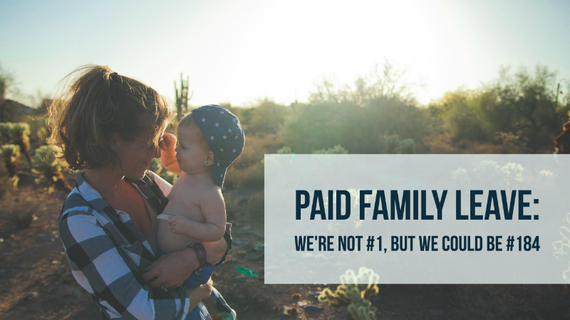76 percent of likely 2016 voters favor the creation of a federal fund for paid family leave in the US.
That's nearly 4 out of every 5 voters, and yet this issue is still seen by many as politically infeasible.
As almost every other country in the world has shown, paid family leave is actually very feasible, both politically and economically. Out of the 185 countries with available information, 183 have managed to implement and sustain it - the two exceptions being the United States, and Papua New Guinea.
This election season, the Democratic Party has brought paid family leave to the forefront more than ever before. Hillary Clinton's official policy proposal calls for 12 weeks of paid medical and family leave, ensuring workers two-thirds of their current wages (up to a ceiling) while on leave.
And, in the spirit of bipartisanship, here's the Trump stance as well:
Well it's something that's being discussed, I think we have to keep our country very competitive, so you have to be careful of it. But certainly there are a lot of people discussing it.
Not exactly a firm policy proposal, but acknowledgment of the issue is nice.
At the end of the day, paid family leave shouldn't be a divisive issue among political parties. The US espouses "American family values" as a hallmark of our nation, and we should all strive to do better by this. It doesn't seem unreasonable for an employer to lend you some good faith in the event of a pregnancy, newborn, sick family member, etc. Here are a few things to look for in a well-crafted paid family leave policy this election season:
Enough time, with a realistic amount of pay
As one Maryland-based bank manager puts it, it "absolutely sucks when [employees] go out on leave," but having a newborn baby is truly "an insurmountable amount of work." The manager - Lance Mercier of Silver Springs, MD - is currently on paid leave taking care of his newborn with his wife, and anticipates needing the full three months he is allowed. Mercier's wife, who only gets eight weeks at 60 percent pay, will have to return to work earlier.
The thing is, this "insurmountable" amount of work that he refers to can increase exponentially if your baby isn't healthy, if you don't have a supportive spouse, if you normally work two jobs to make ends meet. It's difficult to anticipate exactly how much time off you'll need, and a good policy should take this into account.
In terms of a realistic amount of time off, New York state seems to be leading the way in the US by mandating 12 weeks paid time off (at 50 percent salary) to bond with a new child (including adopted or foster children), or to take care of a sick family member. In comparison, California, New Jersey, Rhode Island, and Washington have all passed family-leave insurance programs prior to New York, but the highest of those programs offers only 6 weeks. To give this even more perspective, the UK provides 40 paid weeks, and Bangladesh provides 16 paid weeks.
Social insurance design
Clinton has proposed a tax reform on the wealthiest tax brackets to fund her program, but the best paid family leave policies actually mimic the structure of social security. There are a few reasons for this:
- They're protected from budget cuts:
By funding her program with general tax revenue, Clinton subjects it to the whims of the increasingly frequent budget battles occurring in the US. This would render her program flimsy at best - contingent on the political climate, and likely her being in office to support it.
- Less stigma = more appeal to conservatives:
There's a reason why the Social Security Act has lasted over 70 years, and even avid Tea Partiers admit that it's worth the cost to taxpayers. Because people contribute to social security by working, the benefits are seen as something earned, rather than an entitlement, and thus carry far less stigma than other government programs. Clinton's proposal falters in this sense, and risks playing into the conservative narrative of "takers and makers" (to borrow from Paul Ryan).
Accessible to all genders
Studies have shown that paid family leave can increase employee retention, and reportedly has either positive or no noticeable effect on profitability, turnover, and morale. However, this emphasis on the economic and business consequences obscures an equally-critical consequence of paid family leave: gender equality. In implementing policies accessible to both women and men, we can promote more gender-egalitarian workplaces and households.
In the past few years, such political giants as Barack Obama, Joe Biden, and Andrew Cuomo have brought attention to paid family leave by discussing their own experiences as fathers, and describing the ways these policies benefit men too. It's 2016, and we need to do more to challenge outdated workplace and household norms, and take childcare out of the realm of "women's issues." Etsy, which recently introduced a full 26 weeks of paid family leave, sums it up perfectly: "We want to support and enable parents, regardless of their gender, to play equal roles in building successful companies and nurturing their families."

